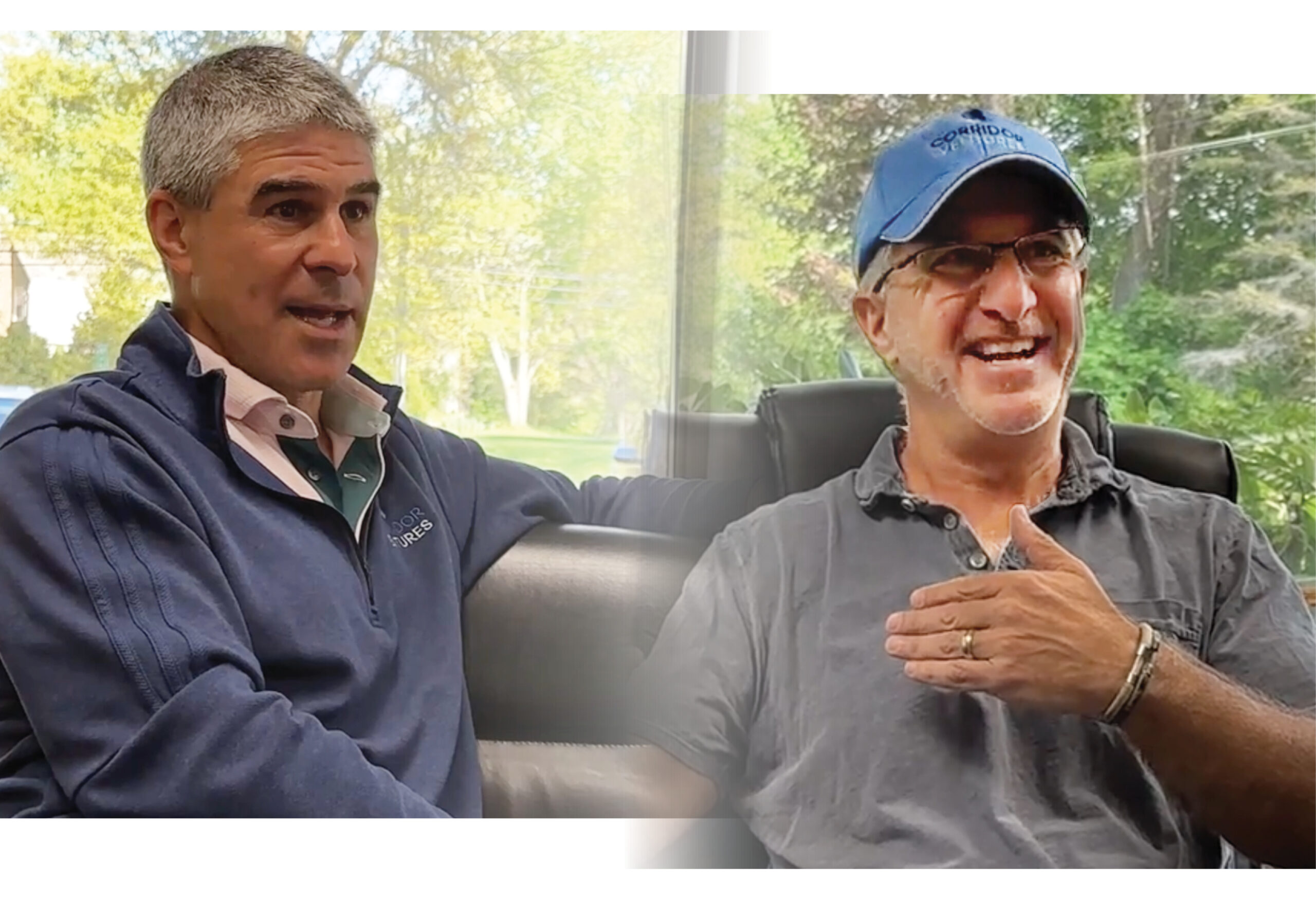How the Corridor Principle guides Corridor Ventures’ success
Dan Joseph and Hagan Brown, co-founders of Corridor Ventures, are often asked about the origin of the name of their company.
It turns out the firm is named after the Corridor Principle, a concept developed by Babson College’s Robert Ronstadt after a 12-year study into the reasons for entrepreneurial success, which states that:
“The mere act of starting a venture enables entrepreneurs to see other venture opportunities they could neither see nor take advantage of until they had started their initial venture.”
Recently, the firm’s two co-founders sat down to discuss their embrace of the Corridor Principle, how it has influenced how they’ve grown their business, what they’ve learned along the way, and where it’s leading them next.

Stepping into the Corridor
From 2001-2006, operating as New England Realty Management, Hagan had built a real estate investment portfolio of student housing and multifamily properties in and around the University of Connecticut, and Dan had partnered with him on several deals as an investor and co-sponsor. In 2005, they were approached by a REIT out of Australia who was interested in purchasing the portfolio, and they decided to take advantage of the opportunity to sell. Through that successful transaction, they achieved several critical objectives:
- They provided significant returns for their investors
- They validated the strength of their partnership, both in identifying opportunities and executing plans, which gave them the confidence to envision expanding beyond Connecticut
- They created liquidity that allowed them to start a new real estate investment company that came with both a “clean slate” and a successful 5-year track record
- They had a chance to create a meaningful name for their next company – Corridor Ventures.
As Dan explains, “I had been introduced to the concept of the Corridor Principle and the idea was very powerful to us. You put yourself into the corridor, jump in with both feet, even if you don’t know what the outcome will be, the doors that will open, or the options that’ll present themselves – the mere act of diving in leads to doors opening and the path to success clarifying over time.”
Hagan adds, “At the time, New England Realty Management was geographically focused. In changing the name, the idea was that Corridor was going to take us out of where we were today and more towards where we wanted to be tomorrow – from a localized focus to a broader spectrum of where we did business, where we wanted to do business and the types of businesses we wanted to be a part of.”
By naming the firm Corridor Ventures, they created a transformative view of what they could become as a company, with the flexibility to pursue the most attractive opportunities they encountered.
As Dan summarizes their embrace of the Corridor Principle, “the scariest aspect is diving in; the riskiest thing is staying on the sidelines.”

Experimenting, Learning & Growing
As they launched their new company, Dan and Hagan recognized the vast opportunity in the student housing sector, which had historically been run by “mom and pop” operators, and where traditional real estate investors weren’t sure how to break in.
They did deeper research, developed a strong case for the resilience of this asset class and leveraged their track record to attract a large equity partner.
With the new partnership in place, the team developed broader geographic exposure and the firm’s portfolio grew quickly from their first student housing acquisition in Athens, Georgia to North Carolina, Ohio, Illinois, Iowa and Pennsylvania. As they entered new markets, they developed geographic expertise, built new relationships, and – true to the Corridor Principle – more doors opened. As Hagan explains, “overnight, we went from being Connecticut-based New England Realty Management to Corridor Ventures, covering 10 to 12 states with thousands of apartments and thousands of student beds under our ownership and management. That was really the beginning of the corridor effect – by opening these doors, we went from a local to a national footprint very, very quickly.”
Through this growth, the firm uncovered investment and capital allocation opportunities and created new partnerships and joint ventures to help execute their strategy.

The Great Financial Crisis Opens New Corridors
Acknowledging the dramatic economic changes that occurred from 2008 – 2009, Dan and Hagan researched and realized that Multifamily Housing was becoming a more opportune asset class, offering reduced risk with substantial long-term upside.
Based on the lessons learned and the team, capabilities and relationships built over the prior five years of student housing acquisition and management growth, Corridor smoothly pivoted in 2010 to a robust Multifamily strategy.
One of the key lessons learned through their student housing growth and their refocus on multifamily was the value they could bring to property management. As Hagan shares, “We learned that no one’s going to love our assets more than we’re going to love our assets. We got very good at acquiring large pieces of real estate across the country, but we relied on third parties to manage those assets because our management operation couldn’t keep up with our acquisition pace. After the great financial crisis, we realized that we needed to rebuild our property management company and we went from ten people to 100, bringing management back in-house.”
In this evolution, Corridor expanded its control, adding asset management, and their reputation as property managers grew. As other property owners grew unhappy with their own management solutions , they started to outsource to the Corridor team.
As Hagan summarizes, “We became a vertically integrated company again with property management, asset management, and construction management.”

Action After Analysis
While the firm and the Corridor Principle have a bias toward action, recent years have brought a barrage of changes – from the rollercoaster of interest rates to climate change and rising insurance costs. The Corridor team’s response has been to continue to make moves, but to be vigilant about continually analyzing risk – to strike the right balance between opportunism and prudence while not getting stuck in ‘analysis paralysis’.
As Dan says, “there’s always a temptation, particularly when you’re entering a period of great economic uncertainty, to be paralyzed and not be able to make decisions. The challenge lies in recognizing when it’s prudent and logical to pause, and when pausing is actually a function of the negative mindset you’re bringing to the table, as a result of the circumstances you find yourself operating in.”
Over their years in business, the Corridor team has developed a research-based, fact-driven approach and process – what they affectionately call their “secret sauce” – that allows them to see opportunities others miss and to create business plans that generate stronger returns. The firm’s perspective is informed by its unique combination of property management, asset management and business planning experience, and from the growing mix of talents on the firm’s team.
With a commitment to analysis and disciplined decision making, sometimes stepping into a new corridor reveals doors that don’t hold up to scrutiny or whose moment has passed, and the team has to say “No”. They’ve learned that the key is to keep opening doors and looking for the next opportunity.

Super-Compounding Partnerships
Over their 20 years in business, the most consistently fruitful corridor has been that of growing their professional network and building new partnerships. These relationships have been so critical to the firm’s success that during a recent rebranding the company identified Powered by Partnership as their tagline.
New opportunities inherently involve partners. This is certainly the case with the One Park project that is underway now. This large development project includes renovating the Sisters of St. Joseph convent in West Hartford, Connecticut and the construction of 294 new upscale apartment homes on the property. The Corridor team was brought into this new asset class – a substantial ground-up development – by a partner to leverage Corridor’s expertise in capital formation around this visionary project.
Sometimes, pursuing an opportunity requires that Corridor find new partners and new capabilities to add to the mix. This was the case when a friend of Hagan’s approached the team about the opportunity to purchase and enhance three office and retail properties – yet another new asset class for the firm – in the highly desirable West Hartford Center.
After researching the asset, the Corridor team realized they needed to add a retail and office leasing partner to the mix to make the most of the opportunity. As Dan shared with the originator of the deal, “Listen, we are game to do this. We can package it, we can bring in the capital, we can supervise the execution of the business plan. But we need to fill in one missing element. We need to bring in an experienced leasing partner and we need to give them a third of the deal. Ultimately, we put together a team with no weaknesses, we had a very clear business plan and, with our partners, we executed flawlessly.”
Longstanding partnerships continually open new doors and create new opportunities for the Corridor team to explore. Most recently these have included investment opportunities in self-storage facilities and European student housing. Dan explains, “The further down the corridor we go, as long as we protect our partnerships and investors and stick to our values, doors open, the path clarifies, and we keep building and improving as a company.”

Sustaining An Entrepreneurial Culture
Over the last 20 years, through multiple market cycles, the firm has redefined itself at many points and the Corridor Principle has continued to be a generative touchstone for its culture. They’ve remained nimble, open-minded, and taken a blank-slate approach to each new opportunity. Through it all, the team’s response has been to embrace change, which not coincidentally, is now one of Corridor’s core values.
Similarly, Dan and Hagan embrace the Corridor Principle when it comes to hiring and investing in the growth of team members. The partners see the potential for people’s future contributions, providing support for their professional growth. And they’ve seen that when their team members step into new career corridors, they rise to meet the moment and find what’s next. This philosophy has created an energized and entrepreneurial culture that attracts talented employees that continue the cycle of growth.
As Dan and Hagan often remind their team, “the Corridor Principle is an anchor idea we go back to over and over and over again. We understand the value of being in the corridor, figuring out what to do when we’re there, knowing that we can be resilient, knowing we can respond to things that change and make decisions based on a real understanding and awareness of who we are and the many ways we can be successful.”

For more information on investing or working with Corridor Ventures, contact info@corridorventures.com.


